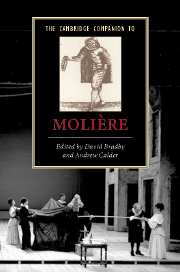Book contents
- Frontmatter
- 1 The career strategy of an actor turned playwright: 'de l’audace, encore de l’audace, toujours de l’audace’
- 2 The material conditions of Molière’s stage
- 3 The master and the mirror: Scaramouche and Molière
- 4 Molière as satirist
- 5 How (and why) not to take Molière too seriously
- 6 L’Avare or Harpagon’s masterclass in comedy
- 7 Laughter and irony in Le Misanthrope
- 8 Comédies-ballets
- 9 Le Bourgeois gentilhomme: Molière and music
- 10 Medicine and entertainment in Le Malade imaginaire
- 11 Molière and the teaching of Frenchness: Les Femmes savantes as a case study
- 12 L'École des femmes: matrimony and the laws of chance
- 13 Molière nationalised: Tartuffe on the British stage from the Restoration to the present day
- 14 Landmark twentieth-century productions of Molière: a transatlantic perspective on Molière: mise en scène and its historiography
- 15 Dom Juan the Directors’ Play
- 16 ‘Reculer pour mieux sauter’: modern experimental theatre’s debt to Molière
- Select bibliography
- Index
- Series List
13 - Molière nationalised: Tartuffe on the British stage from the Restoration to the present day
Published online by Cambridge University Press: 28 March 2007
- Frontmatter
- 1 The career strategy of an actor turned playwright: 'de l’audace, encore de l’audace, toujours de l’audace’
- 2 The material conditions of Molière’s stage
- 3 The master and the mirror: Scaramouche and Molière
- 4 Molière as satirist
- 5 How (and why) not to take Molière too seriously
- 6 L’Avare or Harpagon’s masterclass in comedy
- 7 Laughter and irony in Le Misanthrope
- 8 Comédies-ballets
- 9 Le Bourgeois gentilhomme: Molière and music
- 10 Medicine and entertainment in Le Malade imaginaire
- 11 Molière and the teaching of Frenchness: Les Femmes savantes as a case study
- 12 L'École des femmes: matrimony and the laws of chance
- 13 Molière nationalised: Tartuffe on the British stage from the Restoration to the present day
- 14 Landmark twentieth-century productions of Molière: a transatlantic perspective on Molière: mise en scène and its historiography
- 15 Dom Juan the Directors’ Play
- 16 ‘Reculer pour mieux sauter’: modern experimental theatre’s debt to Molière
- Select bibliography
- Index
- Series List
Summary
The notorious difficulty of reproducing Molière on the British stage has been a commonplace disclaimer in prefatory statements by translators and in programme notes by theatrical directors. The dramatist's verve and comic spirit, steeped in Gallic culture, were perceived as 'foreign' within the British theatrical tradition. Translating Molière's work, as George Meredith warned when analysing the vis comica of Tartuffe, was 'like humming an air one has heard performed by an accomplished violinist of the pure tones without flourish'. Until recently, Molière has not enjoyed the success on the British stage which his status warrants. As John Fowles lamented, Molière has been consigned to a theatrical limbo in Britain, to the status of a study dramatist: 'on the whole, we don't know what to do with him so we leave him alone'. This perceived 'foreignness' has led even to a questioning of Molière's status as a comic dramatist, and of his accessibility beyond the Hexagon.
There is an additional level of 'foreignness' with regard to Tartuffe, which is of all Molière's comedies perhaps the most rooted in seventeenth-century French mores. The concept of the directeur de conscience, introduced by the Counter-Reformation Church in France at the beginning of the seventeenth century, has no equivalent in the British ecclesiastical tradition. This essay will seek to analyse attempts by translators and directors, from Molière's times to the present day, to make Tartuffe accessible to British audiences.
Some translators have opted to retain the notion of a 'foreign text'. These have included, for the most part, the academically orientated translations, intended more for publication than for performance. Some of these are contained in translations of complete works. The dramatic effectiveness of most of these versions has been called into question.
- Type
- Chapter
- Information
- The Cambridge Companion to Moliere , pp. 177 - 188Publisher: Cambridge University PressPrint publication year: 2006
- 1
- Cited by



